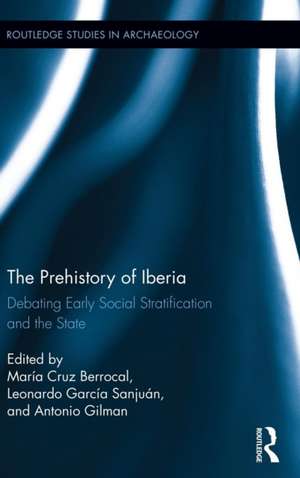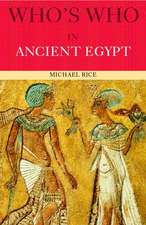The Prehistory of Iberia: Debating Early Social Stratification and the State: Routledge Studies in Archaeology
Editat de María Cruz Berrocal, Leonardo García Sanjuán, Antonio Gilmanen Limba Engleză Hardback – 12 dec 2012
This book illustrates the differing forms of resistances, the interplay between change and continuity, the multiple paths to and from social complexity, and the ‘failures’ of states to form in Prehistory. It also engages with broader questions, such as: when did social stratification appear in western European Prehistory? What factors contributed to its emergence and consolidation? What are the relationships between the notions of social complexity, social inequality, social stratification and statehood? And what are the archaeological indicators for the empirical analysis of these issues? Focusing on Iberia, but with a permanent connection to the wider geographical framework, this book presents, for the first time, a chronologically comprehensive, up-to-date approach to the issue of state formation in prehistoric Europe.
| Toate formatele și edițiile | Preț | Express |
|---|---|---|
| Paperback (1) | 401.24 lei 6-8 săpt. | |
| Taylor & Francis – 10 dec 2019 | 401.24 lei 6-8 săpt. | |
| Hardback (1) | 1072.71 lei 6-8 săpt. | |
| Taylor & Francis – 12 dec 2012 | 1072.71 lei 6-8 săpt. |
Din seria Routledge Studies in Archaeology
- 18%
 Preț: 643.87 lei
Preț: 643.87 lei -
 Preț: 310.22 lei
Preț: 310.22 lei -
 Preț: 326.26 lei
Preț: 326.26 lei -
 Preț: 342.68 lei
Preț: 342.68 lei -
 Preț: 309.65 lei
Preț: 309.65 lei - 26%
 Preț: 766.16 lei
Preț: 766.16 lei - 18%
 Preț: 1108.37 lei
Preț: 1108.37 lei -
 Preț: 384.59 lei
Preț: 384.59 lei -
 Preț: 483.49 lei
Preț: 483.49 lei - 30%
 Preț: 822.76 lei
Preț: 822.76 lei -
 Preț: 389.38 lei
Preț: 389.38 lei - 25%
 Preț: 773.99 lei
Preț: 773.99 lei - 18%
 Preț: 1062.62 lei
Preț: 1062.62 lei -
 Preț: 423.30 lei
Preț: 423.30 lei -
 Preț: 383.50 lei
Preț: 383.50 lei -
 Preț: 388.34 lei
Preț: 388.34 lei -
 Preț: 383.50 lei
Preț: 383.50 lei - 18%
 Preț: 1108.42 lei
Preț: 1108.42 lei - 18%
 Preț: 1064.70 lei
Preț: 1064.70 lei -
 Preț: 389.38 lei
Preț: 389.38 lei - 18%
 Preț: 1059.14 lei
Preț: 1059.14 lei - 18%
 Preț: 1113.16 lei
Preț: 1113.16 lei - 18%
 Preț: 1114.70 lei
Preț: 1114.70 lei -
 Preț: 492.54 lei
Preț: 492.54 lei - 18%
 Preț: 1109.18 lei
Preț: 1109.18 lei - 25%
 Preț: 769.55 lei
Preț: 769.55 lei -
 Preț: 480.62 lei
Preț: 480.62 lei -
 Preț: 469.34 lei
Preț: 469.34 lei - 25%
 Preț: 767.89 lei
Preț: 767.89 lei - 25%
 Preț: 770.62 lei
Preț: 770.62 lei - 25%
 Preț: 823.99 lei
Preț: 823.99 lei -
 Preț: 388.72 lei
Preț: 388.72 lei - 21%
 Preț: 256.87 lei
Preț: 256.87 lei - 18%
 Preț: 1060.52 lei
Preț: 1060.52 lei -
 Preț: 434.63 lei
Preț: 434.63 lei -
 Preț: 485.46 lei
Preț: 485.46 lei
Preț: 1072.71 lei
Preț vechi: 1308.18 lei
-18% Nou
Puncte Express: 1609
Preț estimativ în valută:
205.27€ • 219.50$ • 171.14£
205.27€ • 219.50$ • 171.14£
Carte tipărită la comandă
Livrare economică 18 aprilie-02 mai
Preluare comenzi: 021 569.72.76
Specificații
ISBN-13: 9780415885928
ISBN-10: 0415885922
Pagini: 456
Ilustrații: 46 b/w images, 4 tables, 30 halftones and 12 line drawings
Dimensiuni: 152 x 229 x 30 mm
Greutate: 0.97 kg
Ediția:New.
Editura: Taylor & Francis
Colecția Routledge
Seria Routledge Studies in Archaeology
Locul publicării:Oxford, United Kingdom
ISBN-10: 0415885922
Pagini: 456
Ilustrații: 46 b/w images, 4 tables, 30 halftones and 12 line drawings
Dimensiuni: 152 x 229 x 30 mm
Greutate: 0.97 kg
Ediția:New.
Editura: Taylor & Francis
Colecția Routledge
Seria Routledge Studies in Archaeology
Locul publicării:Oxford, United Kingdom
Public țintă
Postgraduate, Professional, and UndergraduateCuprins
1. Debating Early Social Stratification and the State in Iberian Prehistory: An Introduction María Cruz Berrocal, Leonardo García Sanjuán and Antonio Gilman Part I: Introducing Social Stratification and the State in Iberian Prehistory 2. Were There States During the Later Prehistory of Southern Iberia? Antonio Gilman 3. Archaeology is (Sometimes) History, or It is Nothing María Cruz Berrocal Part II: Case Studies 4. Complex Systems, Social Networks and the Evolution of Social Complexity in the East of Spain from the Neolithic to pre-Roman Times Joan Bernabeu Aubán, Andrea Moreno Martín and C. Michael Barton 5. Villages of Wealth and Resistance in Paradise: Millaran and Argaric Chiefdoms in the Iberian Southeast Antonio Ramos Millán 6. Against Uniformity Cultural Diversity: The "Others" in Argaric Societies Gonzalo Aranda Jiménez 7. Social Complexity in Copper Age Southern Iberia (c. 3200-2200 CAL BC): Reviewing the ‘State’ Hypothesis at Valencina de la Concepción (Seville, Spain) Leonardo García Sanjuán and Mercedes Murillo Barroso 8. Bronze Age Political Landscapes in La Mancha Marcella Chris Brodsky, Antonio Gilman and Concepción Martín Morales 9. Re-Thinking Social Hierarchisation and Stratification in the Bronze Age of the Balearic Islands Manuel Calvo Trías, Daniel Albero Santacreu, Jaime García Rosselló, David Javaloyas Molina and Víctor Guerrero Ayuso 10. Social Dynamics in the Recent Prehistory of Northern Iberia: Examining the ‘Margins’ of the Mediterranean Regions Roberto Ontañón 11. Atlantic Rock Art: Transformation and Tradition during Late Prehistory Manuel Santos Estévez 12. Social Change, Social Resistance. A Long-Term Approach to the Processes of Transformation of Social Landscapes in the NW Iberian Peninsula César Parcero Oubiña and Felipe Criado Boado 13. Big Men Showing Off: The Ideology and Practice of Social Inequality in the Atlantic Late Bronze Age of Iberia Xosé-Lois Armada 14. Non-Hierarchical Approaches to the Iron Age Societies: Metals and Inequality in the Castro Culture of the Northwestern Iberian Peninsula Inés Sastre and F. Javier Sánchez-Palencia 15. Households, Merchants and Feasting: Socio-Economic Dynamics and Commoners’ Agency in the Emergence of the Tartessian world (11th-8th centuries BC) Ana Delgado Hervás 16. Tartessos and the Orientalizing Elites Carlos González Wagner 17. Oppida, Lineages and Heroes in the Society of Princes. The Iberians of the Upper Guadalquivir Arturo Ruiz Rodríguez and Manuel Molinos Molinos Part III: Conclusion 18. Social Stratification and the State in Prehistoric Europe: The Wider Perspective Chris Scarre
Recenzii
"Beyond introducing US students to the Spanish-language archaeology of an important European country where major advances in thinking about prehistory have been relatively recent, the volume is an important introduction to a vibrant tradition of Iberian archaeology that differs from Americanist prehistoric archaeology in being both particularistic and generalizing. Highly recommended." - R. B. Clay, emeritus, University of Kentucky, CHOICE magazine
"A comprehensive, readable, and well-balanced reflection of the current debate on the ability of archaeology to identify social structures and their patterns of change. As a result of the collaboration of different research groups and colleagues, it represents a state-of-the-art work within the debate on social stratification and complex societies in Iberia. It is not just a compilation of case studies. It offers updated data and new hypotheses and perspectives to interpret this complex phenomenon." European Journal of Archaeology
"A comprehensive, readable, and well-balanced reflection of the current debate on the ability of archaeology to identify social structures and their patterns of change. As a result of the collaboration of different research groups and colleagues, it represents a state-of-the-art work within the debate on social stratification and complex societies in Iberia. It is not just a compilation of case studies. It offers updated data and new hypotheses and perspectives to interpret this complex phenomenon." European Journal of Archaeology
Descriere
This volume advances the archaeological study of social organisation in Prehistory, and more specifically the rise of social complexity in European Prehistory. Within the wider context of world Prehistory, in the last 30 years the subject of early social stratification and state formation has been a key subject on interest in Iberian Prehistory. This book illustrates the differing forms of resistances, the interplay between change and continuity, the multiple paths to and from social complexity, and the ‘failures’ of states to form in Prehistory. Focusing on Iberia, but with a permanent connection to the wider geographical framework, this book presents, for the first time, a chronologically comprehensive, up-to-date approach to the issue of state formation in prehistoric Europe.
Notă biografică
María Cruz Berrocal is a Research Fellow at the Institute of Prehistory (CCHS) of the Spanish Higher Council of Scientific Research (CSIC) in Madrid, and has until recently been a MEC/Fulbright Postdoctoral Scholar at the University of California at Berkeley. Her main field of work is rock art in the context of the beginning of food production economies. She has recently undertaken new research on the prehistoric settlement, rock art, and the rise of social complexity in the Fidji Islands.
Leonardo García Sanjuán is a Senior Lecturer in Prehistory at the University of Sevilla (Spain), and has previously occupied academic positions at the universities of Southampton and Bradford (United Kingdom). His main field of interest is social complexity in the Late Prehistory of Iberia, with a special focus of funerary practices and monumental architecture.
Antonio Gilman, professor emeritus in the Department of Anthropology, University of California at Northridge, is an internationally-known authority in the study of social organisation in Prehistoric Europe. Throughout his career he has authored, co-authored and edited several books on the subject of economic and social organisation among European (especially Iberian) Bronze Age societies.
Leonardo García Sanjuán is a Senior Lecturer in Prehistory at the University of Sevilla (Spain), and has previously occupied academic positions at the universities of Southampton and Bradford (United Kingdom). His main field of interest is social complexity in the Late Prehistory of Iberia, with a special focus of funerary practices and monumental architecture.
Antonio Gilman, professor emeritus in the Department of Anthropology, University of California at Northridge, is an internationally-known authority in the study of social organisation in Prehistoric Europe. Throughout his career he has authored, co-authored and edited several books on the subject of economic and social organisation among European (especially Iberian) Bronze Age societies.













